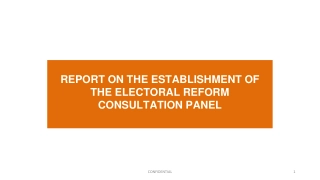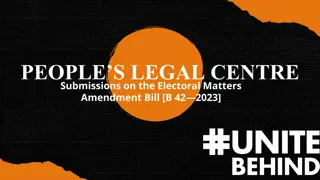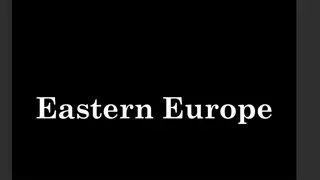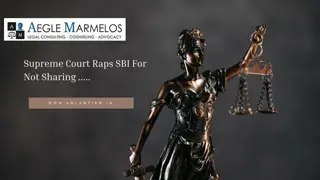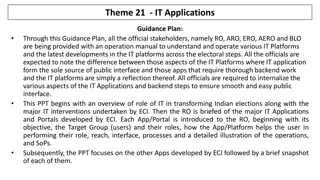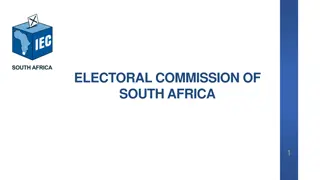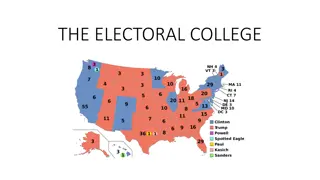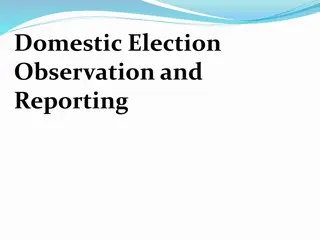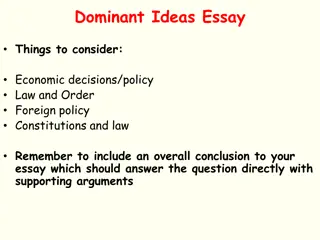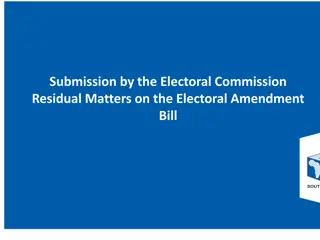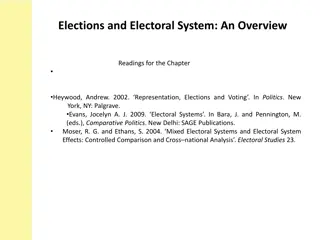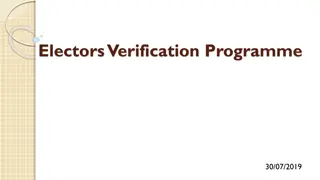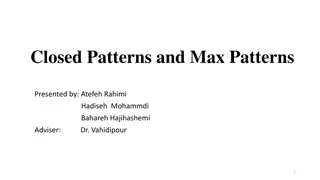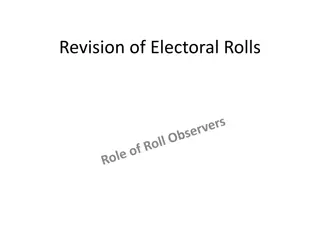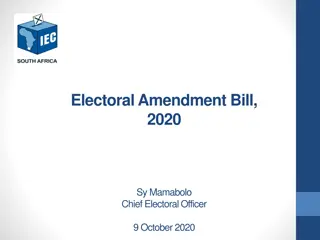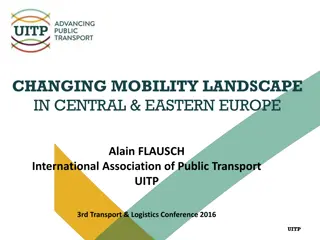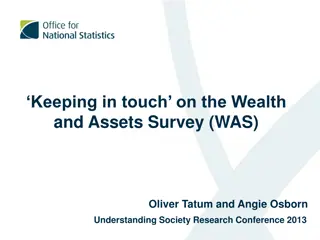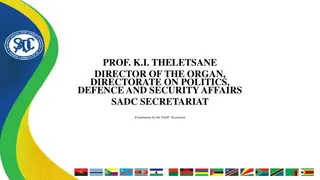Challenges in Longitudinal Survey Research: Electoral Patterns in Eastern Europe
This project explores the impact of candidate characteristics and contextual factors on parliamentary election outcomes in Poland, Hungary, and Ukraine from 1985 to 2014. It involves data harmonization, team collaboration, and academic product creation to analyze democratic processes.
Download Presentation

Please find below an Image/Link to download the presentation.
The content on the website is provided AS IS for your information and personal use only. It may not be sold, licensed, or shared on other websites without obtaining consent from the author.If you encounter any issues during the download, it is possible that the publisher has removed the file from their server.
You are allowed to download the files provided on this website for personal or commercial use, subject to the condition that they are used lawfully. All files are the property of their respective owners.
The content on the website is provided AS IS for your information and personal use only. It may not be sold, licensed, or shared on other websites without obtaining consent from the author.
E N D
Presentation Transcript
Longitudinal Survey Research: Methodological Challenges Harmonization of Survey and Non-Survey Data Overview of the Electoral Control in Eastern Europe Project December 18, 2015 Institute of Philosophy and Sociology, Polish Academy of Sciences Who Wins and Who Loses in the Parliamentary Elections? From Formal Theory to Empirical Analysis, funded by Poland s National Science Centre (Sonata Bis decision number 2012/05/E/HS6/03556)
The grant lasts from 2013 to 2016; its base is the Institute of Philosophy and Sociology, Polish Academy of Sciences (IFiS PAN). This is a cross-national project involving Poland, Hungary and Ukraine. How and to what extent winning and losing in parliamentary elections depends on a combination of candidates characteristics and the contexts from which they come? There are three main aspects of this grant: Collecting the East European Parliamentarian and Candidate data (EAST PaC), building a research team, and creating academic products.
Country Candidates Contextual Matched & Cleaned? Poland 1985 - 2011 2001 - 2011 Yes Ukraine 1990 - 2014 2002 - 2011 Yes Hungary 1990 - 2010 1990 - 2004 Yes
This grant builds a research team: The team collects, cleans and analyzes EAST PaC on issues in accountability, representation and other aspects of the democratic process. Team members come from various institutes and other academic organizations, and are a mix of graduate students and established scholars from Poland, Ukraine, Hungary, Romania, and the USA. Central European University (Hungary), Corvinus University of Budapest, (Hungary), Graduate School for Social Research (IFiS PAN), University of Zielona Gora (Poland), The Ohio State University (USA), Southern Methodist University (USA), SOCIS Center for Social and Marketing studies (Ukraine)
Project Products Archive the data: Polish GESIS-Berlin in 2016 Archiwum Danych Spo ecznych and the Project websites: to present, facilitate, share and collaborate. (a) electoralcontrol.org is open to the public (b) Google Site is currently open only to Project Team members; but access is typically granted upon request.
Project Products Three international workshops in Warsaw, Poland Workshop 1: Winners and Losers in the Elections of Eastern Europe October 18-19, 2013 Workshop 2 and Specialized Course: Parliamentarians, Candidates and Elections in Eastern Europe: From Theory to Empirical Research March 18, 2014 Workshop 3 and Specialized Course: Electoral Control in Eastern Europe December 12 13, 2014
Project Products Dissertations: Peter Tunkis, OSU and Nika Palaguta, GSSR Publications are of methodology of data collection and data cleaning and substantive issues.
Methodology Justyna Ny kowiak. 2014. Construction and Use of a Relational Database to Analyze the Careers of Professional Politicians in Poland, 1985 - 2007 . Ask: Research and Methods 23(1): 115 134. Forthcoming open access edited book on the methodology of the East European Parliamentarian and Candidate data. Topics include: 1. Collecting, matching and cleaning the data for Poland, Hungary, Ukraine and Romania 2. The occupational Codes in EAST PaC for Poland 3. Issues in coding political parties in Ukraine, 2012 - 2014
Substantive Forthcoming guest edited issue of Problems of Post-Communism 1. Do Revolutions Bring Revolutionary Changes? Replacement in the Ranks of Ukrainian Verkhovna Rada Candidacy and Membership, 1990-2014 by Ireneusz Sadowski and Nataliia Pohorila 2. Repeated Elections, Local Ties and the Personal Vote: A Mixed-member Case by Zsofia Papp 3. The Value of Legislative versus Electoral Experience and Gender in Explaining Candidate List Placement in Closed List PR by Mihail Chiru and Marina Popescu 4. The Decline in Occupational Diversity in Polish Politics, 1989 2011 by Sheri Kunovich 5. The Ties that Bind: Do Group Associations Matter among Legislators for Political Parties? By Peter J. Tunkis 6. Candidates Inter-electoral List Mobility in Poland, 2001-2011 by Tomasz Ko odziej and Justyna Ny kowiak
Substantive Proposal for edited book based on EAST PaC data, Electoral Control in Ukraine Chapter 1. A brief political history of Ukraine in the 20th and 21st centuries Chapter 2. Electoral laws and political parties in Ukraine, 1990 - 2014 Chapter 3. Electoral results after political unrest in Ukraine , 1990 2014 (in terms of party ideologies, and the demographic composition of candidates, parliamentarians, of parliament and of parties in power) Chapter 4. Women and politics in Ukraine 1945 2014 Chapter 5. Military Conflict and Women s Political Status in Ukraine Chapter 6. Maidan Across Ukraine, 2013 present Chapter 7. Civil War and Refugees in Ukraine, 2014 present Contributors include: Nataliia Pohorila, Nika Palaguta, Olga Zielinksa, Kataryna Gryniuk, Irek Sadowski, Dorota Woroniecka, Sheri Kunovich, Melanie Hughes, Josh Dubrow and others
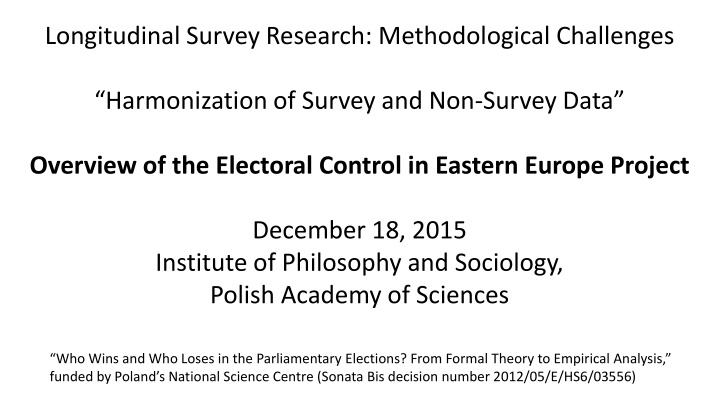

![RE: ELECTORAL MATTERS AMENDMENT BILL [ B42-2023]](/thumb/18837/re-electoral-matters-amendment-bill-b42-2023.jpg)
